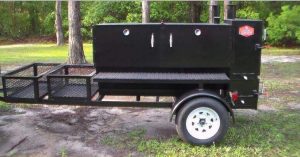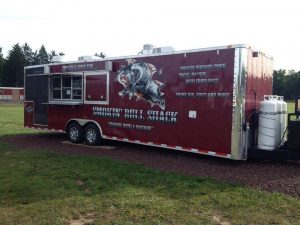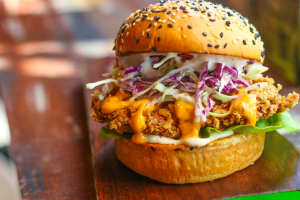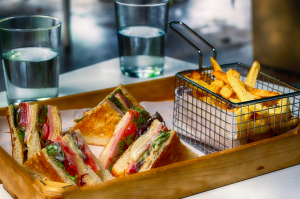See if this scenario sounds familiar. Your food truck or restaurant is humming along, riding high on the wave of seasonal summer business. You’re buying new equipment, making multiple deals with new distributors, expanding your product offerings. Maybe you’re toying around with some new menu ideas, thinking of ways to expand your base of customers, and buying all of those wish-list items that have been plaguing your kitchen and staff since the day you opened. Your credit cards are all paid off, your utility bills are all current, and you start thinking that maybe, just maybe, your fledgling business is going to work out, after all.
Then, just like that, Labor Day weekend hits. You have one final big push of record-breaking sales over the weekend, and you stock inventory loaded for bear the following weekend, only to find that with cooling temperatures, the throngs of people crowded outside your door or at your service window seem to have completely vanished, literally overnight. Your staff is idle, you’ve got product rotting in the refrigerators, and your wish list of new items to buy for the kitchen starts to once again seem beyond your grasp.

Built by M&R Specialty Trailers and Trucks.
For many of us operating food businesses in highly seasonal areas, this is the reality check that accompanies every September. In my town in coastal Maine, where I own and operate Ancho Honey, the tourist traffic each summer increases our population by 60% for a span of about three months, followed by a rapid drop-off once school is back in session. But before the season fully commits to changing, and we get a second wave of visitors driving around in their cars looking at foliage, there’s a lean time that reminds you that the struggle of winter is coming. Many local businesses choose to shutter for the cold winter, while others muddle through with a skeleton crew staff, reduced hours of operation, or drastically simplified menus, just to make it through the winter months.
No matter where you live, you probably see some seasonal ebbs and flows in customers related to the changing season. For many of us, the question is: Is staying open and trying to survive the slower months worth trying, or should I just close my doors and wait for the crowds to return? Let’s take a look at some of the pros and cons of trying to keep your business afloat during slower seasons, as well as a few ways to keep things running smoothly.
Pro: Staying open helps forge a bond with your community

If you can’t stand the heat, cool down the kitchen!
One of the things that’s always frustrated me about growing up in such a seasonal area was what I always perceived as a sort of “smash-and-grab” mentality on the part of local businesses; this idea that business owners would work extra hard when the tourists were here, but would rather stay home when the going got tough.
Now that I’m a business owner myself, I can see that this is sort of an oversimplification; there are challenges and concerns for small business owners during the off season that may not have anything to do with their best intentions. Sometimes, businesses simply can’t make it in the wintertime; this has less to do with what a business owner may WANT to do, and more to do with the simple economics of the season.
One of the things that was really important to me when I opened Ancho Honey, however, was to let my community know that my new business was in total service to them. Sure, the increased business in the summer is nice, but that’s not who I built my business for. Instead, I like feeling like I’m a participant in the “we’re all in this together” attitude that bonds members of a community together in the winter.
During my first winter in my new business, I was floored by how many customers would come trudging in, shaking the snow off of their boots, and THANKING me for making the decision to stay open all winter, and act as a resource for customers who, let’s face it, still need someplace to eat in the winter. By proving my loyalty and commitment to those customers by remaining open, I’m fostering loyalty in them, as well, which will pay dividends all year long.
Con: Utility costs and property maintenance costs increase

BBQ Trailer built by M&R Specialty Trailers and Trucks.
During a sweltering summer, you may forget all about some of the issues that may plague your food truck or restaurant when the winter chill sets in. In the case of my business, the heating oil tank that I ran to almost dry in the spring suddenly presents a major expense I have to tackle in the fall, when the overnight temperatures start dropping into the freezing range.
The increased cost of keeping your business running in the winter don’t stop there. If you have a brick-and-mortar business, you’ll probably need to schedule a block of time with your landscaper, to do an outdoor cleanup and get your property ready for the changing season by clipping back bushes, removing old perennial growth, and doing a final mowing or weeding.
You’ve also got snow removal and plowing to contend with, in addition to increased time spent cleaning the snow and mud that’s been tracked through your entryway. You may find you’re burning additional electricity in an effort to keep your pipes from freezing, or to keep the water in your hot water heater piping hot and ready for service. On the flip side, lower ambient temperatures may make some of your major appliances more efficient. After all, it’s way easier to keep a cooler operating at 40 degrees or lower, when the air itself is only 50 degrees.
Pro: Reduced traffic provide an opportunity to work on pet projects

A fried chicken burger.
If you’re like most small business owners, you probably have a running list of “maybe someday” projects running in the back of your mind. Maybe your dining room could use a new coat of paint. Perhaps you’ve been saving up to finally put a fancy vinyl wrap on your food truck. Or maybe it’s smaller things, like tightening all of the bolts on your dining room chairs.
No matter what projects you have on your list, the reduced traffic in winter provides an excellent time to chip away at some of these tasks, while still making the occasional sale at the same time.
Con: The days are seriously like 6 hours long
This problem affects some parts of the country more severely than others, but here in Maine, we start to see the sun set somewhere around 3:45 in the afternoon. For many of us, this drastically reduced version of “daytime” can be a lot to cope with, psychologically.
It’s hard to leave the house before the sun has come up, and harder to return home in pitch blackness; this routine can start to make it feel like you exist only to serve your food business, and doesn’t leave room for a lot of other activity. This can be mitigated with a change in your schedule; switching to “winter hours” can leave you with an extra day or two per week to enjoy the other parts of your life, including time spent with family, pursuing a hobby, or even something as simple as going for a stroll around the neighborhood.
Pro: Lower volume means you can have more fun in the kitchen
This may be different for everybody, but I find the decreased volume in the winter allows me the opportunity to have a lot more fun in the kitchen, and reconnect with my love of cooking. The fact is, it’s much easier to cook for 50 people, instead of 200. In the wintertime, I tend to experiment with new flavors, experimental platings, and the more difficult-to-execute dishes that would be a chore to produce for hundreds of people, but which are fun for just a few.
In the winter, there’s less pressure to produce food at high volumes, and you can have more fun trying out new ideas. And if one of your ideas is a bust, chances are you won’t waste a ton of product, because you only prepped for a handful of people, instead of hundreds.
Con: Decreased revenue makes retaining staff difficult

Staff is looking for consistent hours.
A major part of my winter survival strategy is running as leanly as possible, when it comes to staff. After all, a business that only has to support me and my family, instead of an army of waitstaff, dishwashers, and prep cooks, can survive on the drastically reduced sales volume that accompanies winter.
You may choose to keep key members of your staff on the payroll through the winter, especially because good employees are so hard to find; however, you’ll probably want to make sure you have enough money in the bank to cover their paychecks during your slower weeks.
Pro: Decreased competition may offer an unexpected boost
The first winter I decided to keep Ancho Honey open year round, I encountered an unexpected surprise, somewhere in late October, that I somehow hadn’t anticipated. Where I live, every other competing restaurant closes for the season. Suddenly, my restaurant was the only game in town, on a stretch of 14 mile long peninsula extending into the sea.
This meant that for anyone local who didn’t feel like cooking, and didn’t feel like making the (potentially perilous, snow-and-ice-covered) trip into town, my business was really the best possible option. This has also been the case just after major winter storms, when roads may be closed and the power grid may be failing; customers use my business as a meeting place to get warm, have a cup of coffee, and grouse about how bad the roads are. During a lonely winter, my business becomes a hub of activity…especially once there are literally no other places nearby for people to go.
In Conclusion
The decision about whether or not to try “toughing out” your seasonal business over the winter months is a deeply personal one, and it may not be a decision dictated strictly by your balance sheet. While sales during the slower months may slow, requiring some creative thinking when it comes to staffing and cashflow, the potential benefits to your community and the increased loyalty in your customers may make a few months of struggle worth it to your small business.
If you have some amount of cash reserves stockpiled over a busy summer, and the desire to keep cooking through the winter, the decision to stay open and become a resource for your community during the long winter may make sense. Conversely, if a crazy summer season has left you emotionally and physically exhausted, it might be a great time for a little break. The best part about owning a business is, it’s entirely up to you.

Leave A Comment